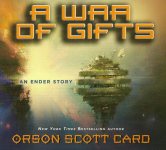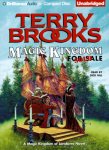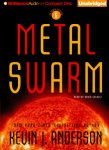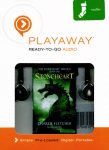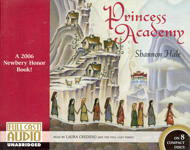
 Seeker: Book One of the Noble Warriors
Seeker: Book One of the Noble Warriors
By William Nicholson; Read by Michael Page
9 CDs – 10 Hours [UNABRIDGED]
Publisher: Brilliance Audio
Published: 2007
ISBN: 9781423318354
Themes: / Fantasy / Epic Fantasy / Young Adult / Religion / Magic / Science /
“Three Very Different Heroes, Brought Together By A Shared Dream”
An elite band of fighter monks called the Nomana (AKA the “Noble Warriors”) guard a garden on the island of Anacrea within which dwells “the god who made all things.” Seeker (AKA “Seeker After Truth”) is an extremely intelligent boy of sixteen. He lives on the island, and wishes to follow his brother, the improbably named “Blaze Of Justice”, into the ranks of the Nomana. His father disapproves and he is forced to apply in secret. Morning Star, a girl of sixteen, can read a person’s aura to determine their character and emotions. She has the same goal, namely to become a Noble Warrior. With her father’s blessing and a hired guard, Morning Star sets out on a long journey to Anacrea. The two applicants are joined in the application line by a unschooled but charismatic seventeen year old brigand known only as “Wildman.” Wildman too is determined to become a “hoodie” (his word for the Nomana) after he found himself and his gang defeated by just two of the Noble Warriors. Far away in the imperial city of Radiance, a plot is hatching which will eventually involve all three youths.
When I first started listening to Seeker I couldn’t place just what kind of fantasy novel I’d taken on. It opens in a classroom, with a student named “Seeker After Truth” taking an important exam and deliberately writing down all the wrong answers. Intriguing, huh? Seeker wants to fail – that way, he hopes his father, who is also the class’ teacher, will free him of his planned destiny.
Author William Nicholson is unusually sparse with description. The setting is a school, but what are the desks made of? I don’t know. Do they have electric lighting? No data available. It takes a while for the listener to settle on what sort of technological capacity these people have and it takes even longer to understand what kind of tale this will be. Is this deliberate? After finishing the novel I’m still not sure. This is Nicholson’s second fantasy trilogy, and he’s crafted a recognizably fantasy epic in an unusual form. Is the lack of visual detail deliberate? It may be. Nicholson had a hand in writing plays and film scripts before finding further success with novels. He wrote the film scripts of First Knight (the Arthurian legend starring Richard Gere), Shadowlands (a biographical film about C.S. Lewis), the Ridley Scott-directed film Gladiator, and most recently Elizabeth: The Golden Age!
What I am sure about is this novel, the first of a trilogy, is about the nature of religious experience. Looking at Nicholson’s upbringing and his career, his writing is never far from either fantasy or religion. And perhaps most interestingly, when the novel first came out, he offered a “personal challenge to the reader” – if you could figure out what the nature of the Anacrean god was, before book two or three came out, he’d send you free copies of the books. He said the Anacrean god “is something you can’t possibly imagine.” Intriguing stuff.
The religions of Anacrea (an island fortress) and the city of Radiance, capital of a vast mainland empire, are both monotheistic. Anacrea’s mysterious god is called the “all and only.” It grants its monkish priests special powers which I can liken only to those of Star Wars‘s Jedi Knights. The Radiance god is the sun in their sky, and the citizens there have practiced ritual human sacrifice at twilight for centuries to keep the sun returning. But there are no magical powers for religious practitioners of Radiance. Instead, the upwardly mobile middle class of Radiance concerns itself with commerce or competes for prestige by buying human sacrificial offerings from slavers. And the Radiance elite, who employ something they call “scientists” are developing a weapon to rid themselves of the meddlesome monks on Anacrea.
The novel is good, but it doesn’t stand well enough on its own for an unreserved recommendation. One of the aspects I quite enjoyed was a kind of a con-game played on some willing believers about four-fifths of the way into the novel. The ending, which provides some resolution, wasn’t particularly surprising or revelatory. Nicholson is a successful playwright and an Oscar nominated screenwriter. It remains to be seen whether the mystery at the center of this trilogy will be as big a payoff as Nicholson is claiming – he calls the Noble Warriors trilogy the “most important thing I’ve ever done.” I’m intrigued enough to listen to the second book, entitled Jango (also available from Brilliance).
Reader Michael Page, a ten audiobook veteran for Brilliance Audio, is a British actor who narrates well. His males are distinguishable, his female voices are too, at typically a pitch lower. At one point though, when we meet a roadside oracle, in what proves to be a funny scene, Page presents a character with a Monty Python-style falsetto. His rendition of the “Wildman,” a major figure in the book, is always filled with a fun bluff gusto. The packaging itself features the handsome paperbook art. Each disc does too, and each opens and closes with a musical cue which is handy for people swapping discs. Each disc has 99 files, the idea being it makes for more accurate bookmarking. But if you’re planning on ripping a disc to put on your MP3 player be aware that not all programs make ripping a disc with this many files easy.
Lastly, a quibble. They’ve spelled “Noble” (of an exalted character) as “Nobel” (like the Swedish chemist). This was fixed for the sequel’s cover.
Posted by Jesse Willis
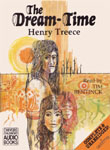

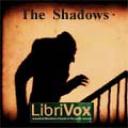 The Shadows
The Shadows
